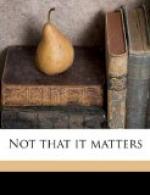“The shepherd-swain of whom I mention
made
On Scotia’s mountains fed
his little flock;
The sickle, scythe or plough he
never swayed—
An honest heart was almost all his
stock.”
Of course, one would hardly expect a shepherd to sway a plough in the ordinary way, but Beattie was quite right to remind us that Edwin didn’t either. Edwin was the name of the shepherd- swain. “And yet poor Edwin was no vulgar boy,” we are told a little further on in a line that should live. Well, having satisfied you that Beattie was really a poet, I can now return to my argument that an eleven-inch Byron cannot stand next to a four-inch Beattie, and be followed by an eight-inch Cowper, without making the shelf look silly. Yet how can I discard Beattie— Beattie who wrote:—
“And now the downy cheek and deepened voice
Gave dignity to Edwin’s blooming prime.”
You see the difficulty. If you arrange your books according to their contents you are sure to get an untidy shelf. If you arrange your books according to their size and colour you get an effective wall, but the poetically inclined visitor may lose sight of Beattie altogether. Before, then, we decide what to do about it, we must ask ourselves that very awkward question, “Why do we have books on our shelves at all?” It is a most embarrassing question to answer.
Of course, you think that the proper answer (in your own case) is an indignant protest that you bought them in order to read them, and that yon put them on your shelves in order that you could refer to them when necessary. A little reflection will show you what a stupid answer that is. If you only want to read them, why are some of them bound in morocco and half-calf and other expensive coverings? Why did you buy a first edition when a hundredth edition was so much cheaper? Why have you got half a dozen copies of The Rubaiyat? What is the particular value of this other book that you treasure it so carefully? Why, the fact that its pages are uncut. If you cut the pages and read it, the value would go.
So, then, your library is not just for reference. You know as well as I do that it furnishes your room; that it furnishes it more effectively than does paint or mahogany or china. Of course, it is nice to have the books there, so that one can refer to them when one wishes. One may be writing an article on sea-bathing, for instance, and have come to the sentence which begins: “In the well-remembered words of Coleridge, perhaps almost too familiar to be quoted”—and then one may have to look them up. On these occasions a library is not only ornamental but useful. But do not let us be ashamed that we find it ornamental. Indeed, the more I survey it, the more I feel that my library is sufficiently ornamental as it stands. Any reassembling of the books might spoil the colour-scheme. Baedeker’s Switzerland and Villette are both in red, a colour which is neatly caught up again, after an interlude in blue, by a volume of Browning and Jevons’ Elementary Logic. We had a woman here only yesterday who said, “How pretty your books look,” and I am inclined to think that that is good enough. There is a careless rapture about them which I should lose if I started to arrange them methodically.




